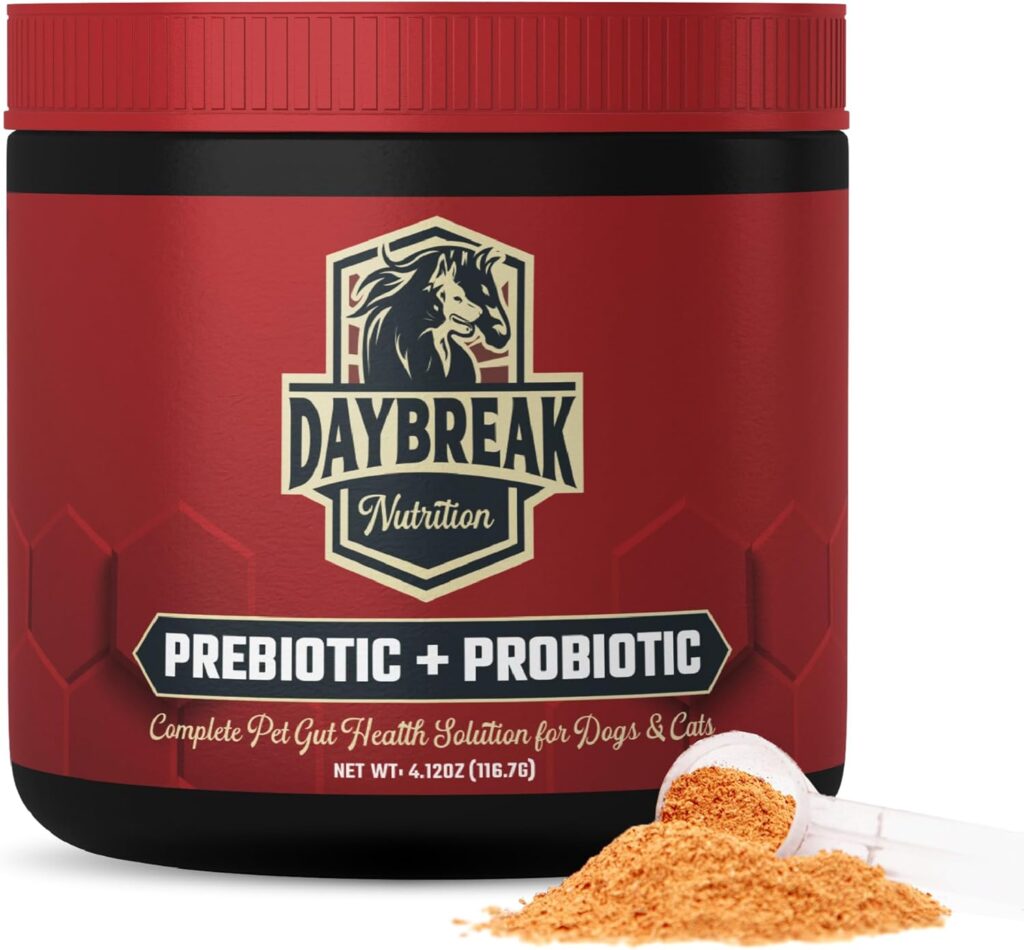Gastrointestinal (GI) problems in dogs can range from mild discomfort to more serious conditions that affect their overall health and well-being.
Whether your dog is experiencing diarrhea, vomiting, constipation, or general digestive discomfort, it’s important to identify the root causes and take steps to support their digestive health.
Understanding what causes GI problems in dogs is the first step toward managing and preventing recurring issues.
In this post, we are going to explore five effective ways to ease GI problems in dogs, starting with the causes.
Let’s dive in!
What Causes GI Problems in Dogs?
Several factors can lead to gastrointestinal problems in dogs, including:
- Dietary Changes: Abrupt changes in food or poor-quality food can disrupt your dog’s digestive system.
- Food Sensitivities or Allergies: Some dogs have sensitivities to certain ingredients like dairy, gluten, or specific proteins.
- Parasites or Infections: Bacterial, viral, or parasitic infections can cause stomach upset, vomiting, and diarrhea.
- Stress or Anxiety: Just like humans, dogs can experience digestive issues due to stress or anxiety.
- Underlying Health Conditions: More serious health problems, such as pancreatitis, inflammatory bowel disease (IBD), or organ dysfunction, can cause chronic GI issues.
Now, let’s explore five effective ways to support your dog’s GI health and ease discomfort.
5 Ways to Ease GI Problems in Dogs
1. Use a Dog Prebiotic and Probiotic Powder
A high-quality dog prebiotic and probiotic powder is one of the most effective ways to support your dog’s digestive health.
Prebiotics help nourish beneficial gut bacteria, while probiotics replenish the good bacteria that support healthy digestion.
Together, these can help regulate your dog’s digestive system, improve stool quality, reduce gas, and soothe sensitive stomachs.
By improving gut flora, prebiotic and probiotic supplements can help address common GI problems like diarrhea, constipation, and bloating.
Out of all of the prebiotic and probiotic supplements my dog has tried, Daybreak’s new Prebiotic + Probiotic is his personal favorite.
Daybreak’s Prebiotic + Probiotic is a fantastic solution for supporting your dog’s gi health, thanks to its powerful combination of 6 billion CFU and 8 premium probiotic strains.
This synbiotic formula, featuring natural prebiotics from flaxseed and pumpkin, helps to improve stool quality, reduce gas, and soothe sensitive stomachs in dogs of all ages.
Its high-potency formula promotes beneficial gut flora, enhancing nutrient absorption and overall gut health.
Simply follow the directions on the back and you’re good to go!
2. Gradual Diet Changes
If you need to change your dog’s food, it’s important to do so gradually to avoid upsetting their stomach.
Sudden changes in diet can lead to gastrointestinal upset, including diarrhea and vomiting.
To prevent this, mix a small amount of the new food with their current food, gradually increasing the new food over the course of a week.
This allows your dog’s digestive system to adjust and reduces the likelihood of GI problems.
3. Feed Smaller, More Frequent Meals
Large meals can be hard on a dog’s digestive system, particularly for dogs with sensitive stomachs.
Feeding smaller, more frequent meals throughout the day can help ease digestion and prevent discomfort.
This approach helps maintain stable blood sugar levels, prevents overeating, and supports overall digestive function.
If your dog is prone to bloating or regurgitation, smaller meals can also help reduce these issues.
4. Provide Digestive Enzyme Supplements
Digestive enzymes can help break down food more efficiently and support nutrient absorption.
Dogs with certain GI problems, such as pancreatitis or exocrine pancreatic insufficiency (EPI), may benefit from enzyme supplements.
These supplements can aid in the digestion of fats, proteins, and carbohydrates, helping to alleviate bloating, gas, and other digestive discomforts.
Consult your veterinarian to determine if digestive enzyme supplements are right for your dog.
5. Reduce Stress and Anxiety
Stress is a common cause of digestive problems in dogs, leading to symptoms such as diarrhea, vomiting, or loss of appetite.
Reducing stress and anxiety is essential for managing GI issues.
Provide a calm, consistent environment for your dog, with access to quiet resting spaces and regular exercise.
If your dog experiences anxiety during trips to the vet, car rides, or during thunderstorms, consider using calming products like pheromone diffusers, anxiety wraps, or natural supplements designed to reduce stress.
Support Your Dog’s GI Problems
GI problems in dogs can be caused by various factors, but with the right care and management, you can significantly improve your dog’s digestive health.
By incorporating a prebiotic and probiotic powder, making gradual diet changes, feeding smaller meals, adding digestive enzymes, and reducing stress, you can support your dog’s gastrointestinal health and ease discomfort.
Always consult with your veterinarian if your dog’s digestive issues persist or if you suspect a more serious underlying condition.
With the right approach, your dog can enjoy a happy, healthy digestive system.
Thank you for reading!
Affiliate Disclosure
Some of the links on this site are affiliate links. This means that if you click on the link and purchase the item, we may receive an affiliate commission at no extra cost to you. I only recommend products or services that I believe will add value to my readers, however some (not all) do pay us to be on this blog. Your support and theirs helps keep this blog running, and I genuinely appreciate it.
Medical Disclaimer
The information provided on this website is for educational purposes only and is not intended as medical advice. This blog or the writer is not a licensed healthcare professional, and the content should not be used as a substitute for professional medical diagnosis, treatment, or advice. Always consult with your physician or other qualified healthcare provider before starting any new treatment or making any changes to your pet’s healthcare routine.

